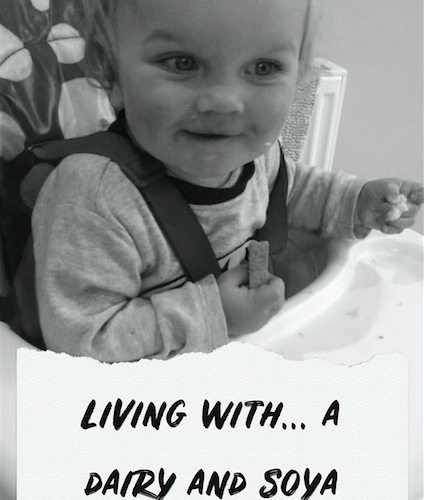Rachel has a two year old son with a soya allergy and a dairy allergy – here she explains how they identified his food issues and how they manage them.
How did you discover your son had an intolerance?
It wasn’t so much a discovery as a long journey to a diagnosis. From around 10 days old we had a very angry and sick baby on our hands. His first appointment with a medical professional was at two weeks old. This would continue week-on-week as we saw no improvement in the amount he was projectile vomiting. The discomfort he was quite clearly in was really upsetting to watch.
I was breastfeeding at the time, but we tried him on formula milk at around six weeks old. It proved to be an absolute disaster. He was even worse. Sleep had deserted our household, I felt I couldn’t leave home with him because he had two modes – screaming or vomiting.
Did you access support?
Yes, many times. I had the Health Visitor on speed dial – she was a fantastic support but ultimately no amount of sleep advice helped. His weight had always gone in the right direction (no wonder, he breastfed night and day), so he was always classed as thriving. There were no immediate health concerns – but he was miserable. He never slept longer than a 40-minute interval (at best). He would thrash around his bed – you could hear his tummy make constant gurgling noises. His skin would flare up in painful-looking blisters and he was still vomiting heavily. We were at the GP surgery many, many times and came away each time with a different anti-reflux medicine or an instruction to increase the dose.
We persevered for a few more months before turning up at hospital in the middle of the night pleading for help. We’d spent weeks taking it in turns to drive him around in the car through the night just to get him to sleep! He was admitted, observed, and we finally got a wonderful paediatrician who listened to us properly. It was at that point that a cow’s milk protein allergy was first mooted. We were also told he probably had a soya allergy. It meant I had to change my diet as he was still exclusively breastfed. The change wasn’t instant but within weeks he started to vomit less, his nappies improved and the thrashing reduced.
What does it mean practically for you and your family?
Total and utter commitment and vigilance. Educating people who care for him on a regular basis. There was once a slip-up where he was given a yoghurt by mistake and he was ill for days. We are very lucky to have a fantastic nursery who are completely on-board and will always contact us to talk through any changes to the menu. I can’t leave the house without a bag packed full with non-dairy alternatives for him. He rarely has anything off a restaurant menu as it’s just not worth the risk.
What are your main concerns?
I worry that as he gets older he has started to notice that he’s missing out. We had a recent run of family birthdays and he started to question why he wasn’t getting any cake! He’s never had chocolate before and now, aged two, has started to notice his friends and sister eating chocolate and has asked for it. There is a real lack of alternatives for “treats” for kids when it comes to milk-free and soya-free chocolate. We did manage to find a chocolate ice cream alternative recently in a supermarket and that was a winner!
How would you describe your attitude to food?
Cautious. We still feel it’s a bit of a minefield out there. We ask in restaurants if their chicken nuggets or fish fingers are milk free – we often get puzzled looks. I don’t think the majority of people realise just how common an ingredient milk powder is in a lot of dishes.
LiberEat’s content is not intended to be a substitute for professional medical advice. You should always take precautions and use appropriate judgement to protect yourself and others under your care with regard to food allergies.
Food allergen rules and regulations continue to change and evolve. Food businesses in production, hospitality, catering, and retail must be vigilant when working with ingredients, products, and dishes containing allergens and exercise due diligence when providing ingredient and allergen information to consumers. Successful allergen management is a big part of food safety professionals’ creating a culture of care and excellence within their teams.
LiberEat offers a second line of defence for food businesses by detecting errors, allergens, and other harmful ingredients with our proprietary Allergen Error Detection Technology. Food businesses can apply this technology directly to identify errors in allergen communications, preventing the risk of injury to consumers 24/7, 365 days of the year so that errors are detected, diagnosed and rectified quickly. We know this helps you protect your brand reputation and enhance customer trust in your brand.
Contact us today to learn more about how we can support your existing food safety processes.

